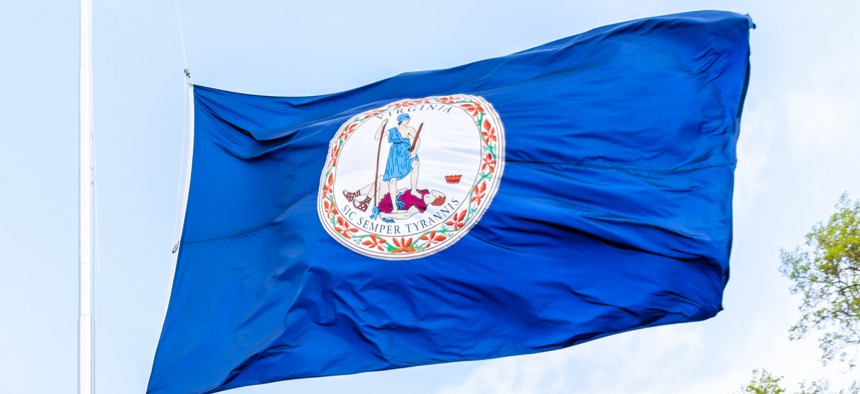Virginia Gov. Details How Part of State’s Volkswagen Settlement Will Be Used

Virginia's flag Shutterstock
The state wants to use the settlement in order to “reduce pollution and advance the clean economy.”
During remarks at at a transportation and innovation summit in Norfolk on Wednesday, Virginia Gov. Ralph Northam announced that his administration would invest $14 million, or 15 percent, of the state’s Volkswagen Environmental Mitigation Trust to fund the deployment of all-electric transit buses.
“Electric transportation is a critical part of our climate strategy to reduce pollution and advance the clean economy,” Northam said in a statement. “This funding will support the move to 21st century transit and help make Virginia an even better place to live, work, play, start a business, and raise a family.”
The Virginia Department of Environmental Quality administers the state’s $93.6 million allocation from a federal settlement with Volkswagen and its subsidiaries over the installation of software designed to beat emissions tests in approximately 500,000 vehicles sold in the United States.
“Not only does this program help ensure transit projects can provide the safe and reliable services our citizens deserve,” Virginia Transportation Secretary Shannon Valentine said in a statement, “but it also makes public transit in Virginia environmentally sustainable and cost-effective for years to come.”
The state’s funding from the Volkswagen settlement doesn’t cover the full cost of purchasing transit vehicles, but it helps makes it less expensive for local governments and agencies to replace diesel buses with electric models.
The details, according to the governor’s announcement:
The Virginia Department of Environmental Quality (DEQ), designated lead agency acting on the state’s behalf to implement Virginia’s allocation ($93.6 million) from the settlement, will provide funding through a new Clean Transportation Voucher Program to replace heavy and medium-duty polluting vehicles with cleaner vehicles. The project will be submitted through the Virginia Department of Rail and Public Transportation’s annual public transportation capital grant cycle known as MERIT (Making Efficient and Responsible Investments in Transit), which begins December 1, 2018, and runs through February 1, 2019.
Earlier this year, the electric vehicle charging station company EVgo was awarded a contract to develop a statewide public electric vehicle charging network. Together, these two funding announcements account for 30 percent of Virginia’s total allocation from the settlement, a significant investment in the transition toward electric transportation and cleaner air.
This second round of funding will serve as an important proof of concept and raise awareness of the availability of electric buses to serve transit agency needs. The goal of the program is to provide enough funding to cover the incremental cost of transitioning from new diesel buses to new all-electric buses.
The Department of General Services (DGS) will soon be adding electric buses to the statewide contract for transit buses. This type of joint procurement decreases administrative and contract costs for local governments and transit agencies. In fact, some transit agencies have already started moving toward electric buses, such as Hampton Roads Transit. ...
MERIT, DRPT’s project-based prioritization process for statewide transit capital funding was recently approved by the Commonwealth Transportation Board (CTB). This prioritization is part of a series of public transit reforms mandated by the 2018 Virginia General Assembly. MERIT will ensure core state-of-good-repair projects, such as replacing or rehabilitating bus fleets based upon their age and mileage, are made the highest priority for state funds and are eligible to have 68 percent of project costs covered by the Commonwealth. The Volkswagen settlement funds, in turn, ensure that local transit agencies can replace their fleets with modern, high-efficiency vehicles, while maintaining the local minimum 4 percent required match.
Michael Grass is Executive Editor of Government Executive’s Route FIfty and is based in Seattle.
NEXT STORY: Building a Solid Brand Is Not Just for the Private Sector






